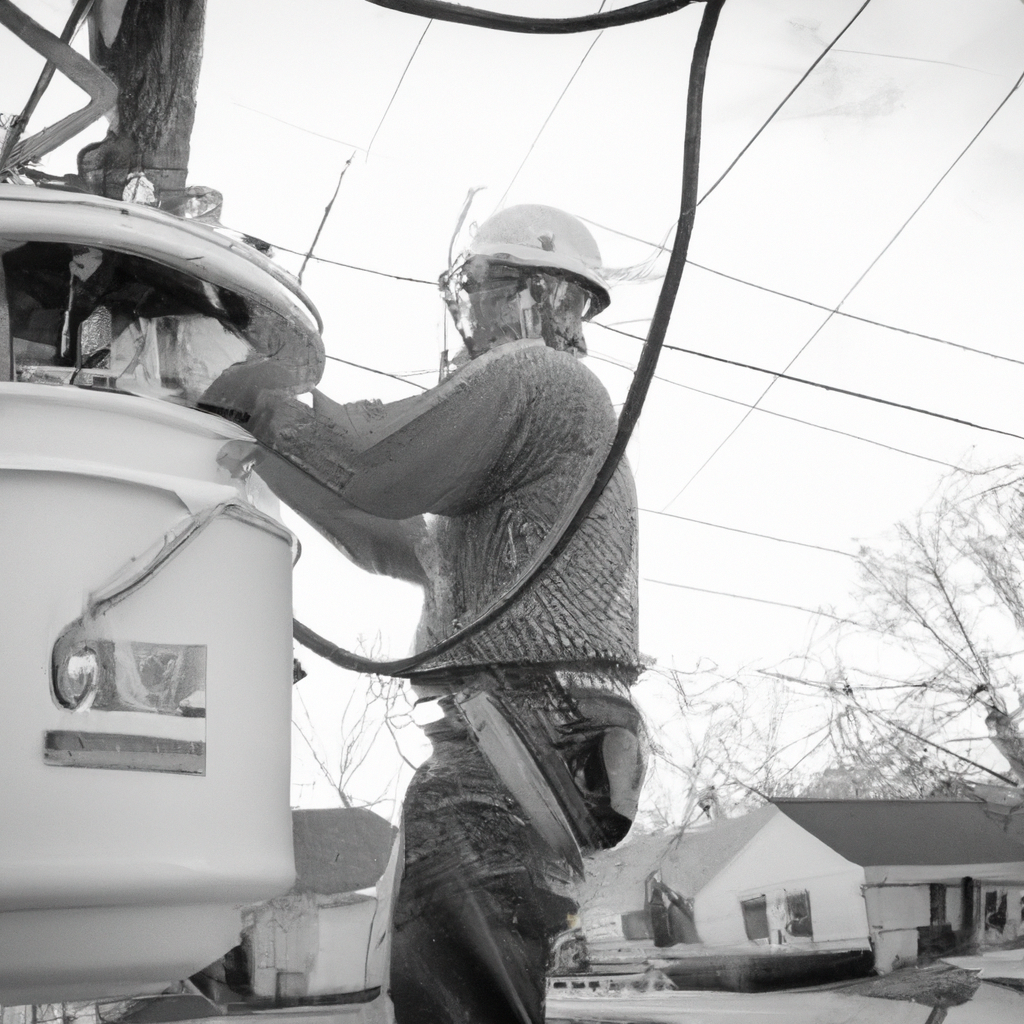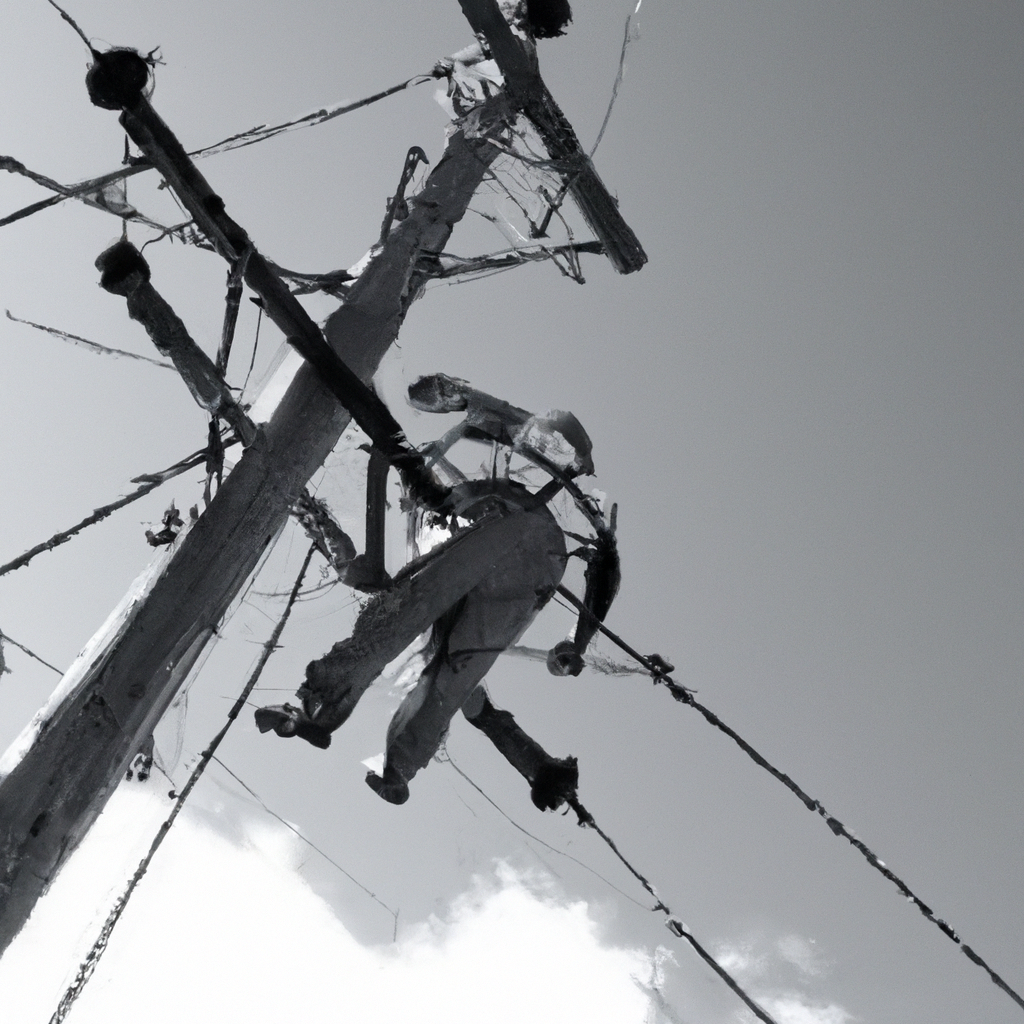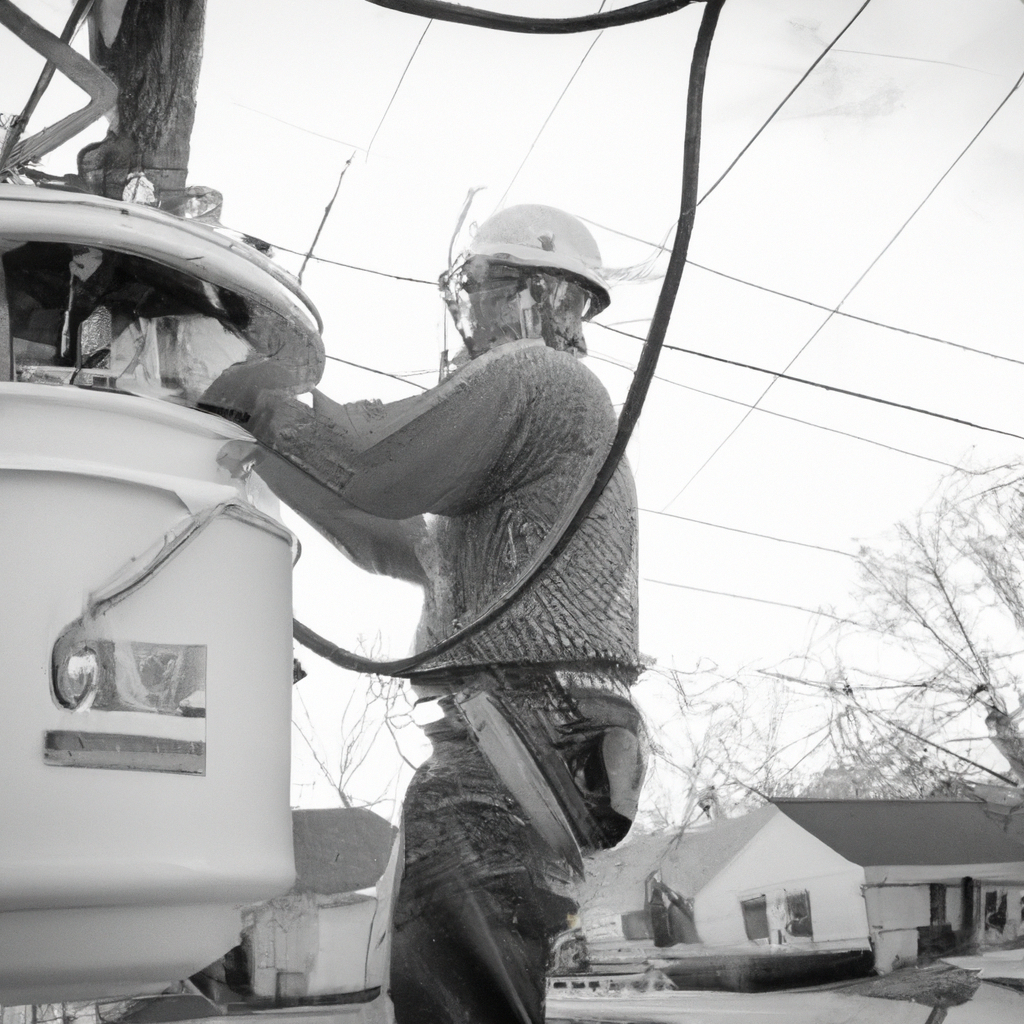In the exhilarating world of the lineman profession, the heights you climb are not just measured in feet but in triumphs and challenges conquered. As a lineman, you embark on a courageous journey, scaling towering poles and braving the elements to serve and connect communities through the power of electricity. With every ascent, you push boundaries, both physical and mental, and unlock a sense of fulfillment that only the brave can truly understand. The linemen, the unsung heroes of the electrical industry, reach great heights, not only in elevation but in their unwavering commitment to keeping the lights on for everyone.
Job Description
As a lineman, your primary responsibility is to install, repair, and maintain electrical power systems. You will work on overhead power lines and power distribution systems, ensuring that they are functioning safely and efficiently. Additionally, you will be responsible for troubleshooting any electrical problems and ensuring that power is restored in a timely manner. It is important for you to have a thorough understanding of electrical systems and be able to work comfortably at great heights.
Responsibilities of a lineman
As a lineman, you will have a diverse range of responsibilities. Some of the key tasks include:
- Installing and repairing power lines and utility poles
- Maintaining electrical infrastructure, including transformers and switches
- Conducting inspections and identifying potential issues
- Performing routine tests to ensure system functionality
- Responding to electrical outages and restoring power
- Working collaboratively with a team to complete projects
- Adhering to safety regulations and using protective equipment
Skills required for the profession
Being a lineman requires a specific set of skills to perform the job effectively. Some of the essential skills include:
- Technical proficiency: Understanding electrical systems and being able to troubleshoot and repair issues is crucial.
- Physical fitness: Climbing heights and performing strenuous tasks requires excellent physical strength and stamina.
- Attention to detail: Being meticulous in your work is essential to ensure the safety and functionality of electrical systems.
- Problem-solving abilities: Electrical issues can be complex, and being able to identify and solve problems is essential.
- Collaboration: Working well in a team and effectively communicating with coworkers is crucial for project success.
- Safety consciousness: Being aware of safety protocols and diligently following them helps prevent accidents and injuries.
Working conditions
As a lineman, you will often find yourself working outdoors in various weather conditions. This can include extreme heat, cold, rain, or snow. Additionally, you will frequently work at heights, sometimes suspended from a bucket truck or climbing poles. It is important to have a good sense of balance and be comfortable working in such conditions. The job may also require you to work during emergencies or irregular hours, as power outages can occur at any time.
Importance of safety
Safety is of paramount importance in the lineman profession. Working at heights and dealing with electricity carries inherent risks. It is essential for you to follow safety protocols and use the appropriate protective equipment at all times. Adhering to safety measures not only protects your own well-being but also ensures the safety of your coworkers and the general public. Safety training and regular refresher courses are common in the industry to ensure that linemen are up to date with the latest safety practices.
Training and Education
To become a lineman, most individuals start with an apprenticeship program. These programs typically last for several years and involve a combination of on-the-job training and classroom instruction. During the apprenticeship, you will learn about electrical theory, safety practices, and the technical skills required for the profession. Some apprenticeship programs may also include specialized training in areas such as transmission or distribution.
Apprenticeship programs
Apprenticeship programs provide a structured learning experience for aspiring linemen. These programs are often sponsored by utility companies, industry associations, or trade unions. Apprentices work alongside experienced linemen and receive hands-on training in various aspects of the job. The duration of apprenticeships varies but typically ranges from two to four years. Throughout the program, apprentices gradually take on more responsibility and learn specialized skills, culminating in becoming a fully-fledged journeyman lineman.
Certification requirements
While certification is not always required, it can significantly enhance job prospects and provide validation of your skills and knowledge. Several organizations, such as the Northwest Lineman College and the Electrical Training Alliance, offer certification programs for linemen. These programs typically involve both written and practical exams to assess your proficiency in various aspects of the profession. Achieving certification demonstrates your commitment to continuous learning and professional development.
Continuing education
In the lineman profession, it is crucial to stay updated with advancements and changes within the industry. Continuing education opportunities are available to help linemen sharpen their skills and expand their knowledge. These may include workshops, seminars, or online courses that cover topics such as electrical code changes, new technologies, and safety practices. It is advisable to take advantage of these opportunities to ensure that you remain current and can provide the best service to your clients or employer.
Career Progression
The lineman profession offers various opportunities for career progression and advancement. Once you have completed your apprenticeship and become a journeyman lineman, you will typically start working independently on projects. From there, you can progress to a foreman position, where you will supervise a team of linemen and oversee projects. As you gain more experience and expertise, you may have the chance to move up to higher positions in management or even become an electrical superintendent.
Hierarchy within the lineman profession
In the lineman profession, there is a hierarchical structure that defines the roles and responsibilities of individuals. The hierarchy typically includes the following positions:
- Apprentice: An individual who is new to the profession and undergoing training.
- Journeyman Lineman: A certified and experienced lineman who can work independently.
- Foreman: The supervisor of a team of linemen, responsible for overseeing projects and ensuring their successful completion.
- Superintendent: An upper-level management position that involves overseeing multiple projects and teams.
Moving up the career ladder
To move up the career ladder in the lineman profession, it is important to demonstrate your skills, knowledge, and dedication to the job. Taking on additional responsibilities, such as volunteering for challenging projects or mentoring new apprentices, can showcase your leadership abilities. Additionally, continuing to pursue education and training opportunities can help you stay ahead of industry advancements and increase your chances of advancement.

Opportunities for specialization
Within the lineman profession, there are opportunities to specialize in specific areas. These specializations can include transmission line work, distribution line work, or substation maintenance, among others. Specializing in a particular area allows you to develop expertise and may open up additional career opportunities. However, it is important to note that specialization often requires additional training and experience.
Tools and Equipment
As a lineman, you will work with a variety of tools and equipment to perform your tasks effectively. Some of the essential tools include:
- Climbing gear: Lineman belts, hooks, and spikes are essential for scaling poles or towers.
- Safety equipment: Protective gear, such as hard hats, safety glasses, and gloves, is vital for safeguarding against electrical hazards.
- Testing equipment: Voltmeters, ammeters, and other testing tools allow you to diagnose and repair electrical issues.
- Bucket trucks: These vehicles, equipped with an extendable boom and bucket, provide a safe platform for working at heights.
- Hand tools: Wrenches, pliers, and wire strippers are indispensable for various electrical tasks.
Essential equipment for climbing heights
Climbing heights is an integral part of a lineman’s job. To ensure safety and efficiency, linemen use specialized equipment specifically designed for climbing. Some of the essential equipment includes:
- Lineman belt: A harness-like belt with D-rings that allows you to climb poles or structures securely.
- Climbing spikes: Sharp metal spikes that attach to the lineman belt and provide a sturdy grip on the pole.
- Safety lanyard: A adjustable strap that links the lineman belt to the pole to prevent falls.
- Fall arrest system: A harness and lanyard combination that stops your fall should you slip or lose your grip.
- Climbing helmet: A protective helmet that safeguards against head injuries.
Inspection and maintenance procedures
Regular inspection and maintenance of tools and equipment are crucial to ensure their safe and efficient operation. Some key procedures include:
- Visual inspection: Checking for any visible signs of damage or wear on tools and equipment.
- Cleaning and lubrication: Keeping tools clean and well-lubricated to prevent rust and ensure smooth operation.
- Functionality tests: Testing equipment to ensure they are operating as expected.
- Calibration: Verifying the accuracy of measuring tools such as voltmeters or ammeters.
Technological advancements
The lineman profession has seen significant technological advancements that have enhanced the efficiency and safety of the job. Some notable advancements include:
- Drones: Unmanned aerial vehicles equipped with cameras can assist linemen in inspecting power lines from the air, reducing the need for manual inspections.
- Remote monitoring systems: These systems allow linemen to remotely monitor power lines and quickly identify issues or outages.
- Augmented reality (AR) tools: AR technology can provide linemen with visual overlays, helping them identify equipment or access relevant information while working.
- Advanced climbing gear: Innovations in climbing gear have improved comfort, safety, and ease of use, reducing fatigue and the risk of accidents.
Physical Fitness
Physical fitness plays a vital role in the lineman profession. As a lineman, you will be frequently climbing heights and performing physically demanding tasks. Maintaining a good level of physical fitness is essential for optimal job performance and safety.
Importance of physical fitness in the profession
Physical fitness directly impacts a lineman’s ability to perform their duties effectively. A high level of fitness enables you to climb heights with ease, endure long hours of work, and handle heavy equipment or materials. It also helps reduce the risk of fatigue, which can lead to accidents or errors.
Specific fitness requirements
Some of the specific fitness requirements for linemen include:
- Upper body strength: Having strong arms, shoulders, and core muscles is crucial for climbing and performing tasks above ground.
- Cardiovascular fitness: A good level of cardiovascular fitness enhances endurance and stamina, allowing you to work for extended periods.
- Flexibility: Being flexible helps you maneuver through challenging positions and maintain balance while working at heights.
- Balance and coordination: Having good balance and coordination is essential for climbing poles or structures and carrying out precise tasks.
Training and exercises for climbers
To maintain physical fitness, linemen can engage in various training and exercises. Some recommended activities include:
- Strength training: Performing exercises such as weightlifting or resistance training to build and maintain muscle strength.
- Cardiovascular exercises: Engaging in activities like running, swimming, or cycling to improve endurance and cardiovascular fitness.
- Stretching and flexibility exercises: Incorporating stretching routines into your fitness regime to improve flexibility and range of motion.
- Balance and coordination exercises: Practicing activities like yoga or Pilates to enhance balance, coordination, and body control.
Challenges and Risks
The lineman profession comes with its fair share of challenges and risks. It is important to be aware of these challenges and take appropriate measures to minimize risks and ensure personal safety.
Working in extreme weather conditions
Linemen often work in various weather conditions, including extreme heat, cold, rain, and snow. These conditions can be physically demanding and increase the risk of accidents or health issues such as heatstroke or hypothermia. Taking necessary precautions, such as staying hydrated, wearing appropriate clothing, and using sunscreen or protective gear, can help mitigate the risks associated with extreme weather conditions.
Dealing with electrical hazards
Working with electricity exposes linemen to potentially life-threatening hazards. Electrical shocks, burns, and arc flashes are significant risks in the profession. It is essential to follow proper safety procedures, wear appropriate protective gear, and ensure that work is carried out in accordance with established electrical safety standards. Regular training and adherence to safety protocols significantly reduce the likelihood of electrical accidents.

Preventing falls and injuries
Working at great heights increases the risk of falls and injuries. Falling from a pole or a bucket truck can have severe consequences. Linemen must use proper fall protection equipment, such as safety harnesses and lanyards, and adhere to safety practices when climbing or working at elevated heights. Inspecting equipment regularly and reporting any faults or damage is also essential to prevent accidents.
Rewards and Benefits
The lineman profession offers several rewards and benefits that make it an attractive career choice.
Salary and compensation packages
Linemen generally earn competitive salaries, commensurate with the physical demands and risks associated with the job. Additionally, they often receive benefits such as health insurance, retirement plans, and paid vacation time. The compensation packages for linemen can provide stability and financial security for individuals and their families.
Job stability and demand
As the demand for electricity continues to rise, the need for skilled linemen remains steady. Power outages and maintenance of power infrastructure are ongoing requirements, ensuring a stable job market for linemen. The profession often provides long-term job stability and security.
Opportunities for advancement and growth
The lineman profession offers opportunities for career progression and personal growth. From entry-level positions, individuals can move up the career ladder and take on roles with increased responsibility. Specialization in specific areas or pursuing further education can also provide avenues for advancement.
Job Outlook
The current state of the lineman profession is promising, with a steady demand for skilled linemen across various industries. Additionally, advancements in technology and infrastructure improvements present opportunities for growth and development within the industry.
Current state of the lineman profession
The lineman profession is essential in ensuring a reliable and efficient supply of electricity to homes, businesses, and communities. As the demand for electricity continues to increase, so does the need for skilled linemen to install, repair, and maintain power systems.
Trends and advancements in the industry
The industry is witnessing several trends and advancements that are shaping the future of the lineman profession. These include the integration of renewable energy sources, grid modernization initiatives, and the use of smart technology to enhance power systems’ efficiency.
Future opportunities and challenges
The future of the lineman profession holds various opportunities and challenges. The ongoing transition to renewable energy sources and the need to upgrade and expand power infrastructure create new avenues for employment. However, technological advancements and evolving industry standards will require linemen to continuously update their skills and adapt to changing practices.
Job Satisfaction
Job satisfaction is an important aspect of any profession. In the lineman profession, it comes from a sense of accomplishment, essential connections, and contributing to community development.
Sense of accomplishment
Completing a challenging project or restoring power after an outage provides linemen with a profound sense of accomplishment. The ability to make a tangible impact and improve the lives of others through their work is a source of great satisfaction.
Creating essential connections
As a lineman, you will work closely with your team members, utility companies, and the broader community. Building camaraderie and creating strong connections within these networks can enhance job satisfaction.
Contributing to community development
The lineman profession plays a crucial role in community development. By ensuring the reliable supply of electricity, linemen contribute to the growth and progress of towns, cities, and regions. The knowledge that their work makes a positive difference in the lives of others often brings great satisfaction.
Famous Linemen
Throughout history, several linemen have made significant contributions and achieved recognition in the profession.
Notable individuals in the profession
- Walter M. Newton: A respected pioneer in the lineman industry who formulated safety standards and promoted the use of protective gear.
- J.D. Ross: An influential figure in the development of transmission line construction and a leading expert in high-voltage electrical systems.
- Charles B. Marchand: A lineworker known for his innovative approaches to electrical system design and construction, improving efficiency and safety.
Their achievements and contributions
The contributions of these linemen have had a lasting impact on the profession. Their dedication to safety, technical expertise, and commitment to innovation have advanced the field and helped shape it into what it is today.
Inspirational stories
Countless linemen have inspiring stories of bravery, resilience, and dedication in the face of adversity. From working tirelessly during natural disasters to going above and beyond to ensure power restoration, these stories depict the true spirit of the lineman profession.
In conclusion, the lineman profession is a challenging yet rewarding career choice. With opportunities for advancement, competitive compensation packages, and the ability to make a tangible impact on communities, it is a profession worth considering for those who enjoy practical, hands-on work and are committed to safety and excellence.




